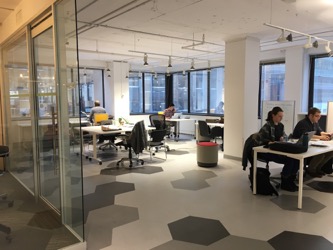Centretown technology companies push for open-concept office buildings
By Daanish Rehman
Downtown Ottawa appears to be on the brink of a makeover as high-tech companies look to occupy more open-concept office buildings and work environments for increased productivity, a leading commercial real estate executive says.
Shawn Hamilton, senior vice-president and managing director of the commercial real estate firm CBRE Ottawa, said the final catalyzing agent in pushing for a revamped commercial sector for Centretown is spreading awareness of how these workplace layouts help businesses grow.
Hamilton said as Ottawa’s burgeoning tech-industry grows in the central business district, it will bring “a younger, resident workforce that will live in the downtown core.”
With “the emergence of open-concept high technology, new-economy clients, we’ll have a resident young population that will have demands for lifestyle, live, work play, within the core,” Hamilton said. He also pointed out that he “can see Ottawa start to begin its shift to becoming what’s referred to as an 18-hour city.”
The Ottawa Business Journal recently featured Hamilton and other players in the commercial real estate industry in a story anticipating a “sea change” in the downtown office market driven by the migration of tech firms.
The idea that downtown Ottawa is on the cusp of an exciting transformation was also highlighted last year by the city’s bid to attract Amazon’s second North American headquarters to a soon-to-be redeveloped section of LeBreton Flats. However, the company recently shortlisted 20 cities, with Toronto the only Canadian finalist.
High-tech darling Shopify’s headquarters at 150 Elgin St. has also been touted as a model for attracting other technology firms to downtown Ottawa.
“This generation is demanding more out of life,” Hamilton said. “They expect it from their space. People have a choice on where they work, so space needs to keep up with the demands of people in order for companies to attract and retain and engage their talent.”
Hamilton has worked in Ottawa’s real estate industry for more than 25 years, and has watched the city grow. Hamilton said Nortel, the now-defunct telecommunications company that was the seedbed for Ottawa’s tech industry, had an early influence on ideas about organizing workplaces with its model of space optimization in the 1980s.
“Open concept used to be a way to be efficient,” said Hamilton, “to save money and put more people in less space. Now, Ottawa is looking to harness the power of community in our space, and create environments whereby people can communicate and interact more efficiently.”
Caitlin Kealey, CEO of MediaStyle, a Centretown-based open-concept style public-affairs agency, discusses similar ideas regarding her own workspace. According to Kealey, “the open concept started in the beginning because we were a new small start-up…a little scrappy agency, and we just could afford one room.”
MediaStyle has since expanded aggressively and now occupies two floors at 131 Bank St. The workspace model has worked and the company hasn’t felt the need to change it. She says “the team is quietly cohesive and they kind of have to be, because they’re sitting next to each other all day long instead of just seeing each other at lunch.”
But Katie Miller, managing director of Impact Hub, a Centretown-based co-working office with open-concept spaces, says the “latest research that has come out is that purely open concept spaces aren’t any more beneficial in terms of work culture and work productivity as closed offices. Actually what employees need is diversity of space, diversity of options.”
She advocates for hybrid open-concept offices. A larger office is compartmentalized into different sections, with each section offering a different noise level, or isolation level. She advocates accommodating the younger generation of workers by learning for each individual “what their best working practices are, because most people vary in terms of what works best.”
Hamilton said Ottawa’s downtown will continue to be energized by the young workers who increasingly spend their days in open-concept office space in the core.
“The future is coming at us faster than it’s ever come before, as technology is coming at an exponential pace of growth,” Hamilton said. “That energy is what gives a city an identity, and what gives a city a breath of life. I think that will be a key contributor to Ottawa growing and reaching its full potential.”

